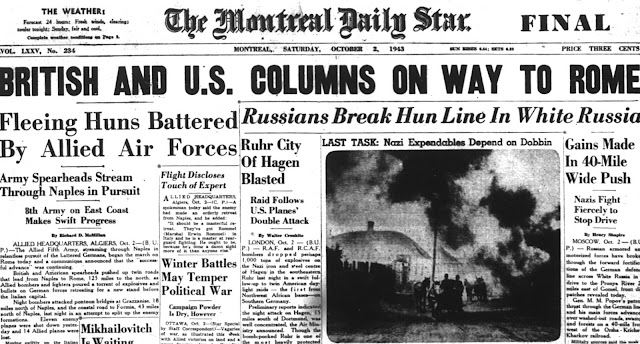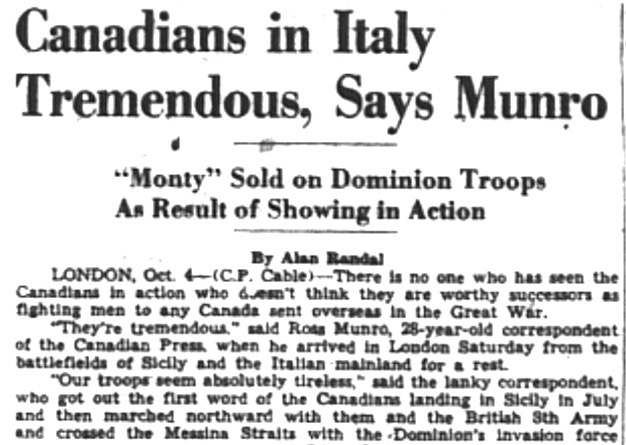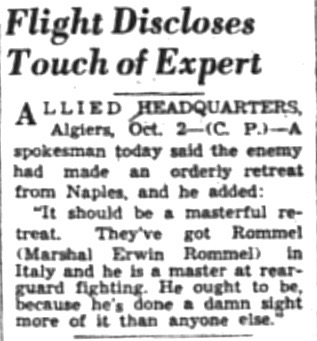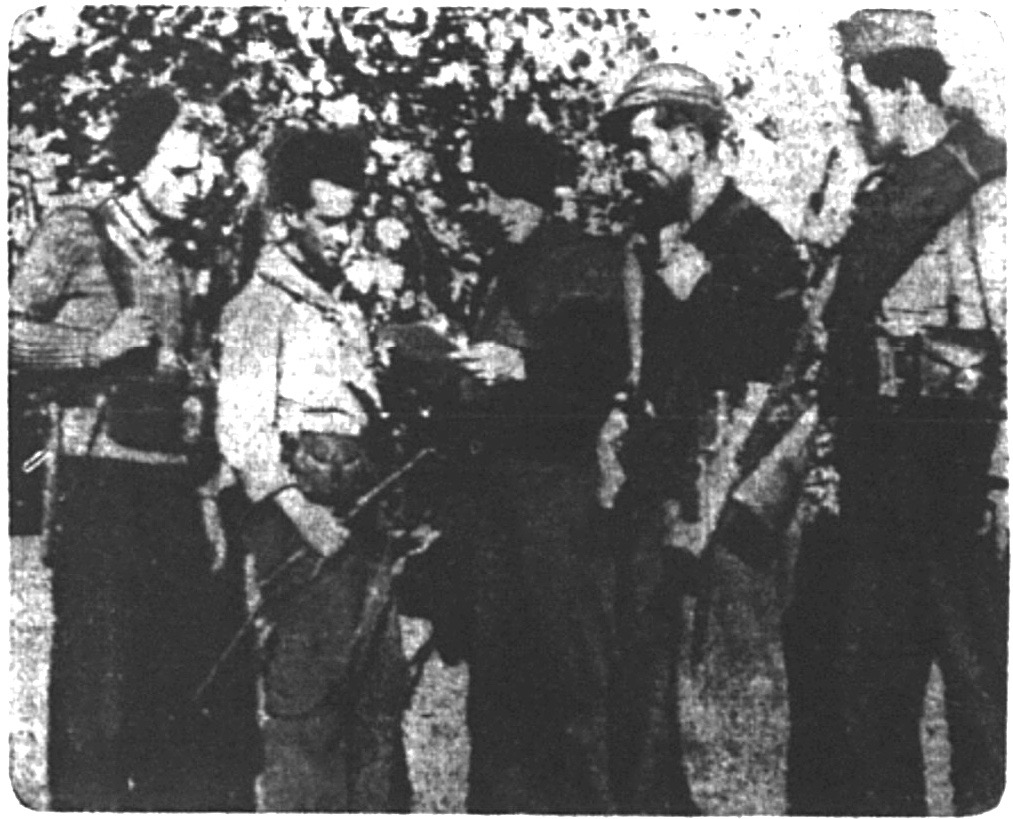Canadian Forces Receive Praise From Monty
The headline is very positive. Reality is otherwise. Rome was not reached
in 1943. Monte Cassino and winter and more slogging ahead.
Though the writing is on the wall for Hitler's forces on various fronts, they are well dug-in in Italy's mountainous region north of Naples and will not be budged easily. Headlines in Canadian newspapers, like The Montreal Star above, give readers the wrong impression. Allied forces will not enter Rome until June 4, 1944.
That being said, "Monty" is sold on Canadian troops, as we read below! As well, and in the prize article below we learn why my search for news articles by Sholto Watt of The Montreal Star continues at a snail's pace - from Ross Munro's own experiences related to getting current news to Canadian readers.
I was delighted to read this piece because I have been wondering why Mr. Watt's columns about action in Italy (and his possible hook up with Canadians in Combined Ops aboard their flotilla of landing crafts) have been delayed. For example, though our landing crafts plied the waters between Messina (Sicily) and Reggio (toe of Italy's boot) beginning on September 3rd, Mr. Watt's article about being in Messina - and seeing the bombardment of Reggio in the early hours of the third - did not appear in The Star until September 29th.
If subsequent articles are delayed in the same manner I may be continuing my research (looking for news about his trip to Reggio aboard a Canadian landing craft - and did he sit next to my father?) into early November issues of The Star. Yipes!
At least, thanks to Alan Randal's interview of Ross Munro, I now have some first hand information about why news was (is) delayed:
As Munro's own story continues, I learn two important details that relate to the posting of war correspondents' news articles and the trips made by landing crafts between Messina and Reggio. I knew that the trip between the two ports was seven miles but I didn't know that it was "pretty dubious travel."
I believe the article above is the prize of this post, especially for those (like myself) who had a family member handling landing crafts in the Mediterranean theatre of war.
My father's memoirs make the invasion if Italy sound like an easy breeze, and maybe it was, but only in comparison to the invasion of Sicily where they were attacked by German planes every two hours for the first several days).
However, we can learn much in subsequent news about the conditions of the times:
We read about "amphibious ducks" in the last paragraph above. Though they seem smaller than an LCM (the workhorse of many a D-Day, including Normandy) they had the advantage of being able to drive ashore on four wheels and move quickly to a supply dump or other designated area.
"Near-miss on an amphibious duck, on the Anzio beach" (later date in Italy)
Photo Credit - Eclipse, by Alan Moorehead, Page 70
Photo Credit - Details re DUKWs, at Wikipedia.
Though DUKWs or ducks were new faces in the war, 'dobbins' (horses) were not:
I copied this brief article from the October 2nd issue of The Star because it touches on a tragedy that could easily be overlooked in studies of WW2 events, a vast enterprise to be sure.
Pte. Peter Yarenkvitch, 25, of Fisher Branch, a small community 150 km. north of Winnipeg, Manitoba, never made it to the battlefields of Europe. He "died almost immediately" of wounds suffered "during battle practice."
His brief story originated in Sydney, N.S., was put out on the C.P. newswire and posted on an inside page of The Montreal Star. The tragic event took place 84 years ago and, after checking Google recently, I learned that the name Yarenkvitch does not appear in the Fisher Branch White Pages (online phone book) today. Nor does it appear in surrounding communities.
Did the name die after Peter's parents passed away? A derivation of the name (perhaps) appears three times in Winnipeg. Could 'Yaremkevichs' be distant relatives? Unknown.
We know from previous stories that the Allied landings at Salerno were fiercely contested by German forces. Below we read a vivid description of the desperate battle there:
More details follow about the sinking of HMCS St. Croix. The lone survivor, stoker W. A. Fisher, actually went through two sinkings before returning to safety. It is known that Mr. Fisher continued to serve in different capacities, i.e., by travelling from place to place in Canada to encourage people to purchase War Bonds. He also spent time at Canada's Combined Operations training centre on Vancouver island, and while there became known to my father and is mentioned in his memoirs.
The above report seems to be an early one. Subsequent reading reveals extensive damage in many parts of Naples.
More news follows from various war fronts:
More news from Italy to follow, some from Sholto Watt!
Please link to Invasion of Italy (17) - Montreal Star (Sept. 30 - Oct. 1, '43)
Unattributed Photos GH












































No comments:
Post a Comment